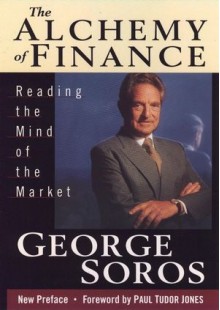
Let's not skirt around the issue here- this book loses about a bajillion points* for having a man in a suit with his arms folded on its cover.
What does having your arms folded on the cover of your book say?
Typically one of two things:
1. "I'm taking back my America one book at a time!"; or (and this one is more common)
2. ADVICE!! "I am about to give you lots and lots of advice that will solve all of your problems and/or make you rich and/or force you to acknowledge that you'll never be able to follow my advice and, thus, are a failure."
Don't believe me? I'll let this little array speak for itself.**

Spoiler alert! (but not really), looks like George Soros fell victim to some terrible advice in book coveriness, because The Alchemy of Finance doesn't tell you how to do squat (or take back America, or the night for that matter, but I digress). So, if you're hoping for a step-by-step breakdown of how to land yourself in the top 20 of the Forbes 400, walk away now.
Why read this book if it won't make me rich??
If you're really asking yourself that question, then the answer is probably don't bother. However, if you're like me, (in addition to being awesome) you'll swoon as soon as he drops Karl Popper's name in the first ten pages (you know, the whole understanding of the self presupposes objectivity thing).
If that doesn't do it for you, don't walk away just yet. What this book is really about is Soros' theory of reflexivity, in "the markets" and how the assumptions of traditional Economics have gotten things oh so wrong. It's much more philosophical than it is financial, and George Soros is a pretty smart dude.
Why alchemy?
Alchemy and science are not the same thing (duh). Science is about finding an underlying truth — scientific theories are supposed to be "universally valid". Soros' theories of the market, however, are not. Why not? Because (according to Soros) he has been more prone to "predictive failures."
Alchemy, unlike science, is about operational success. This is why Soros has been able to fail to predict things about the world, but still rake in big bucks. The Market operates as a product of social phenomena- it's not like nature, where "laws operate independently of what anybody thinks."
"This creates an opening for alchemy that was absent in the sphere of natural science. Operational success can be achieved without attaining scientific knowledge. By the same token, scientific method is rendered just as ineffectual in dealing with social events as alchemy was in altering the character of natural substances."
Anything else?
I'm no economist, but I do like to dabble in the study of decision making, cognition and human behavior and, turns out, those things are pretty darn interrelated. My point? I'm probably going to bungle any attempt at real explanation, so I'll just point out a few bits and pieces.
- Homo economicus He doesn't exist, get over it! Humans are not rational actors and, even if we were, no one actually has all the options laid before them.
- Stock prices are the reflection of some underlying reality there is no "essential price" toward which a stock will inherently trend and certainly no reality that exists independent of our perceptions.
- Stock prices are shaped by underlying trends and prevailing biases which are then either self-reinforcing or self-correcting. Sometimes events fail to occur because they were anticipated.
- I'll give you one more for fun (and also because it confuses me): the act of lending changes the value of collateral.
Why the low rating?
This book is old (I think it's my junior by only a few years). Soros brings up interesting ideas, but IMHO there are far more interesting books to be read on most of them (e.g. if you want to talk recursion, then Douglas Hofstadter's your man). Maybe someone more familiar with The Market than I would disagree, but it's my review, and he did fold his arms while wearing a suit on the cover.
_______________________________________________
* I'm sorry, but I can't be more precise due to adjustments for inflation and ever fluctuating currency markets, so you'll just have to live with my rough estimate.
** No, I haven't read any of these books, but can you blame me?
back to top


 Log in with Facebook
Log in with Facebook 












 My name is Maya Banks and I live in Texas with my husband and three children and our assortment of pets. I’m more of a cat person, but my daughter became convinced she NEEDED a dog. So convinced in fact that it became her mission to convince her father and me. She prepared a two page handwritten proposal that detailed WHY she needed a dog, and well, after I sent her to her father (I knew he wouldn’t tell her no) we embarked on the search for the perfect dog. The journey that was two hours away and that I got pulled over for speeding while I was on the phone with my agent who had an offer from a publisher for one of my books… The officer wasn’t impressed. He wrote me a ticket anyway. Thus, I now tell my daughter that her dog turned into one very expensive concession! But isn’t he cute?
My name is Maya Banks and I live in Texas with my husband and three children and our assortment of pets. I’m more of a cat person, but my daughter became convinced she NEEDED a dog. So convinced in fact that it became her mission to convince her father and me. She prepared a two page handwritten proposal that detailed WHY she needed a dog, and well, after I sent her to her father (I knew he wouldn’t tell her no) we embarked on the search for the perfect dog. The journey that was two hours away and that I got pulled over for speeding while I was on the phone with my agent who had an offer from a publisher for one of my books… The officer wasn’t impressed. He wrote me a ticket anyway. Thus, I now tell my daughter that her dog turned into one very expensive concession! But isn’t he cute?








